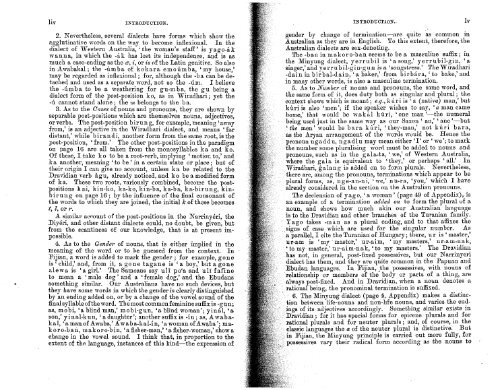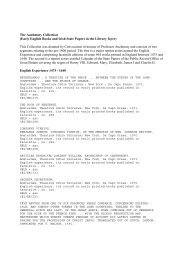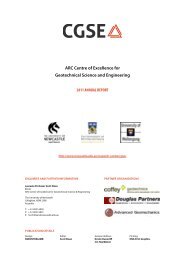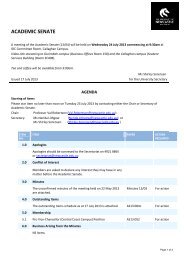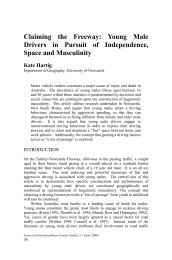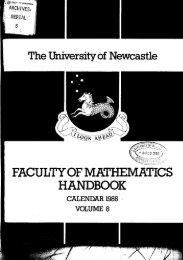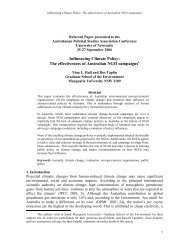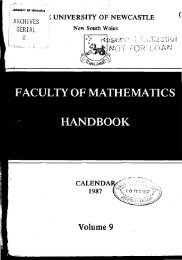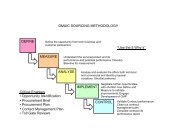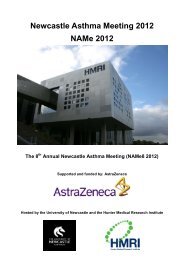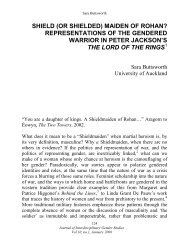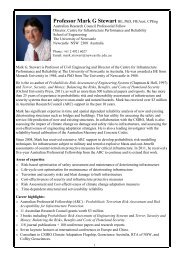n - University of Newcastle
n - University of Newcastle
n - University of Newcastle
You also want an ePaper? Increase the reach of your titles
YUMPU automatically turns print PDFs into web optimized ePapers that Google loves.
liv IKTBODCCTION.<br />
2. Nevertheless, several dialects have forms which shom the<br />
agglutinative xords on the way to become inflexional. In the<br />
dialect <strong>of</strong> Western Australia, . the woman's staff ' is yago-li k<br />
wanna, in which the -ik has lost its independence, and is as<br />
much a case-ending as the a, i, or is <strong>of</strong> the Latin genitive. So also<br />
in Awabakal ; the -6mba <strong>of</strong> kokara emo fim ba, ' my house,'<br />
may be regarded as inflexional ; for, although the -ba can be de-<br />
tached and used as a separate word, not so the -dm. I believe<br />
the -6nlba to be a weathering for gu-mba, the gu being s<br />
dialect form <strong>of</strong> the post-position ko, as in Wiradhari; yet the<br />
-6 cannot stand alone ; the 91% belongs to the ba.<br />
3. As to the Cases <strong>of</strong> nouns and pronouns, they nre shown by<br />
separable post-positions which are thenlselves nuuna, adjectives,<br />
or verbs. The post-position birung, for example, meaning 'away<br />
from,' is an adjective in the Wiradhari dialect, and means 'far<br />
distant,' while birandi, another form from the same root, is the<br />
post-position, 'from.' The other post-positions in the paradigm<br />
on page 16 are all taken from the monosyllabl~s ka and ko.<br />
Of these, I take Iro to be a root-verb, implying ' motior to,' and<br />
lia another, meaning 'to be ' in a certain state or place ; but <strong>of</strong><br />
their origin I can give no account, unless ka be related to the<br />
Draridian rerb Agu, already noticed, and ko be a modifiedform<br />
<strong>of</strong> ka. These tn-o roots, rariously combined, become the post-<br />
positions k ai, kin-ko, ka-ko, kin-ba, ka-b a, ka-birung, kin-<br />
birung on page 16 ; by the influence <strong>of</strong> the final consonant <strong>of</strong><br />
the words to which they are joined, the initial k <strong>of</strong> these becomes<br />
t, Z, or 9-.<br />
A similar account <strong>of</strong> the post-positions in the Karrinybri, the<br />
Diybri, and other distant dialects could, no doubt, be given, but<br />
from the ~cantiness <strong>of</strong> our k~olvledge, that is at present im-<br />
possible.<br />
4. As to the Gender <strong>of</strong> nouns, that is either implied in the<br />
meaning <strong>of</strong> the word or to he guessed from the context. In<br />
Fijian, a word is added to mark the gender ; for example, gone<br />
is ' child,' and, from it, a gone tagane is ' a boy,' but a gone<br />
alema is 'a girl.' The Samoans say uli po'a and uli f afine<br />
to mean a ' male dog' and a 'female dog,' and the Ebudans<br />
something similar. Our Australians have no such devices, but<br />
they hare some words in which the gender is clearly distinguished<br />
by an ending added on, or by a chauge <strong>of</strong> the vorrel sound <strong>of</strong> the<br />
finalsyllable<strong>of</strong>theword. Thelllostcommonfeminine suffix is -gun;<br />
as, mobi, 'a blind man,' mobi-gun, 'a blind woman'; yinril, 'a<br />
son,' yinal-kun, ' a daughter'; another suffix is -in ; as, Awaba-<br />
lral, 'a man <strong>of</strong> Awaba,' Awab a-kal-in, 'a moman <strong>of</strong> Amaba '; ma-<br />
k oro-ban, In akor o-bin, 'a fisher-man,' 'a fisher-woman,' shom a<br />
change in the vowel sound. I think that, in proportion to the<br />
extent <strong>of</strong> the language, instances <strong>of</strong> this kind-the expression <strong>of</strong><br />
INTRODCCTION. lv<br />
gender by change <strong>of</strong> termination-are quite as common in<br />
Australian as they are in English. To this extent, therefore, the<br />
Australian dialects are sex-denoting.<br />
The -ban in n~akoro-ban seems to be a masculine suffix ; in<br />
the Minyung dialect, yerrubil is 'a song,' yerrubil-gin, 'a<br />
sin~er,' md y err u b i 1-gin-g u n is a 'songstress.' The Wjradhari<br />
-daln in birbal-dain, 'a baker,' from birblira, ' to bake,'and<br />
in many other words, is also R masculine termination.<br />
5. As to LVu~~zber <strong>of</strong> nouns and pronouns, the same word, and<br />
the same form <strong>of</strong> it, does duty both as singular and plural ; the<br />
context shows which is mcant ; e.g., k u ri is ' a (native) man,' but<br />
kfiri is also 'men'; if the speaker wishes to gay, 'a man came<br />
home,' that ~oulcl be walidl kriri, 'one man '-the numeral<br />
UP Saxon ' an,' ' ane '-but<br />
woman' (page 49 <strong>of</strong> Appendix), is<br />
ion aclded 0% to form the plural uf a<br />
m much akin our Australian language<br />
ian and other branches <strong>of</strong> the Turaniall family.<br />
in as a plural euding, and to that affixes the<br />
case which are used for the singular number. As<br />
I cite the Turallian <strong>of</strong> Hungary; there, ur is ' master,'<br />
my ' master,' ur-aim, ' my masters,' ur-am-nak,<br />
ter,' ur-aim-nak, 'to my masters.' The Dravidian<br />
general, post-fixed possessives, but our I'u'arrinyeri<br />
hem, and they are quite common in the Papuau and<br />
guages. In Fijian, the possessives, with nouns <strong>of</strong><br />
or members <strong>of</strong> the body or parts <strong>of</strong> a thing, are<br />
. And in Dravidian, when a noun denotes a<br />
inal termination is suffixed.


